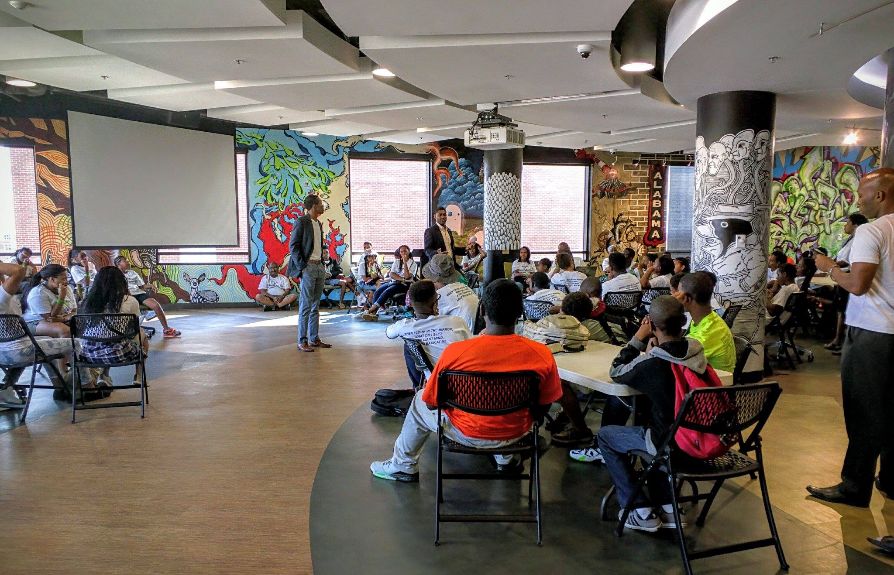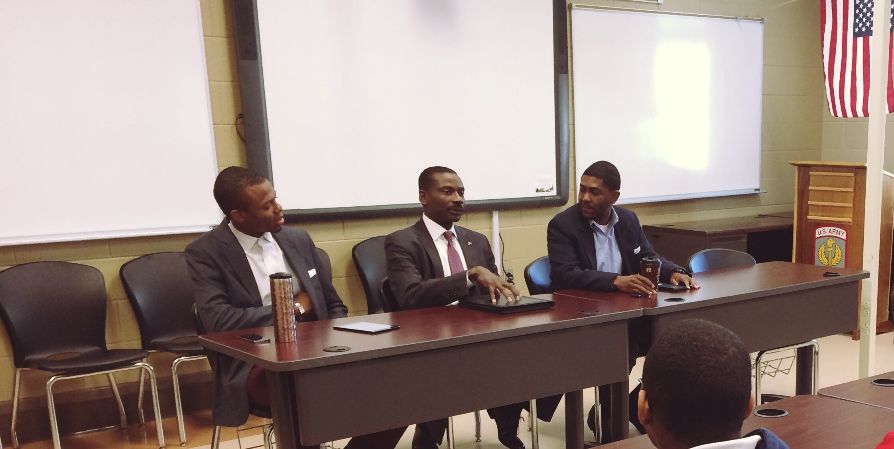- Do you have any pictures or videos on your social media accounts associated with the phrases “turnup!”, “yolo!”, or World Star!”?
- What do your Instagram, Facebook, Snapchat, and/or Twitter profiles say about you?
- Did you know 40% of college admissions officers report checking applicants’ social media accounts prior to offering admission?
- Have you ever heard of LinkedIn? If so, were you aware that you can have an account as early as 14 years of age?
- Would having a well-developed LinkedIn profile afford you a competitive advantage in the college admissions process?

These are questions we asked over 150 high school juniors in the Birmingham City School System recently during the 3rd Annual Career Development Conference hosted by the Birmingham Education Foundation and the Birmingham Rotary Club.
The conference was designed to provide high school students with career and college readiness training from local professionals and entrepreneurs. The conference covered essential skills such as personal resumes, mock interviews and elevator pitches.

I, along with a couple of my colleagues from the Collat School of Business’ Innovation Lab, assisted with this year’s conference. Mickey Millsap, adjunct professor of entrepreneurship and Innovation Lab mentor, hosted a workshop on “Getting in the Door: Resumes That Will Get You the Interview.” Mickey is a seasoned entrepreneur who has had the privilege of interviewing many would-be employees and interns for his various for-profit and not-for profit enterprises including uShip and Youth Entrepreneur Labs.

Consistent with Mickey’s resume workshop, Rickey Jay White Jr. and I hosted a series of workshops (4 workshops at 40 students each) on “The Time is Now: Professional Branding for Students.” The workshops were largely extensions of our current work with students in the UAB Collat School of Business and elsewhere in the City of Birmingham. The title, “the time is now” was meant to admonish the students that you can’t wait until you submit the job or college application to get serious about developing a professional portfolio. By then, it’s too late.
Students were introduced to concepts such as mission, vision, and core values—concepts that re no doubt familiar to business and startup leaders. However, students were asked to apply these concepts to their lives. We asked the students: What’s your personal mission? Where is your career vision taking you? What are your core values and what would be the impact on your academic or professional career if you compromised any of them? What is a brand and what does your personal and professional brand say about you? Your family? Your school? Is any of this consistent with what is currently displayed on your social media accounts?
Rickey’s company, Uncommon.Creative., creates value for clients via social media branding, management and engagement. Rickey’s clients include companies across several industries including business, academia, non-profit and government. Additionally, Rickey is currently involved in several student-facing social media initiatives in the UAB Collat School of Business, the UAB Office of Supplier Diversity and the UAB Innovation Lab at Innovation Depot.

I coach emerging and seasoned professionals in business and academia in the art and science of stratemy. Stratemy, or the strategy of me, involves the translation of the principles of competitive advantage, disruptive innovation and entrepreneurship from a business to a professional development context. Stratemy is a term I coined several years ago to describe my approach of helping professionals to view their careers as startup businesses and themselves as CEOs of their career-based startups. The idea is certainly not new, but my approach to it is.
Combining our respective approaches, Rickey and I have developed seminars and workshops that have helped organizations, teams and individuals become more strategic and entrepreneurial in how they create and grow their personal and professional brands. Based on the feedback and engagement from the conference participants, we suspect we have made a significant impact on the trajectory of these bright young students.
Although many students asked us for business cards, we refused. Instead, we told them their “homework” would be to develop their own LinkedIn accounts and connect with us there. To facilitate continuous professional development, we created a members-only group on LinkedIn for “alumni” of our workshop. This group will serve as a learning community and support group as these emerging strategists and entrepreneurs commit to growing their career-based startups. To our delight, we began receiving our first LinkedIn connection requests less than 24 hours after the conclusion of the conference.
Perhaps there’s a student in your life that could stand to be more strategic and entrepreneurial as it relates to their personal brand, professional profile or career. If so, you might find the notes from our session helpful.
Let us know what you think by leaving a question or comment here.



